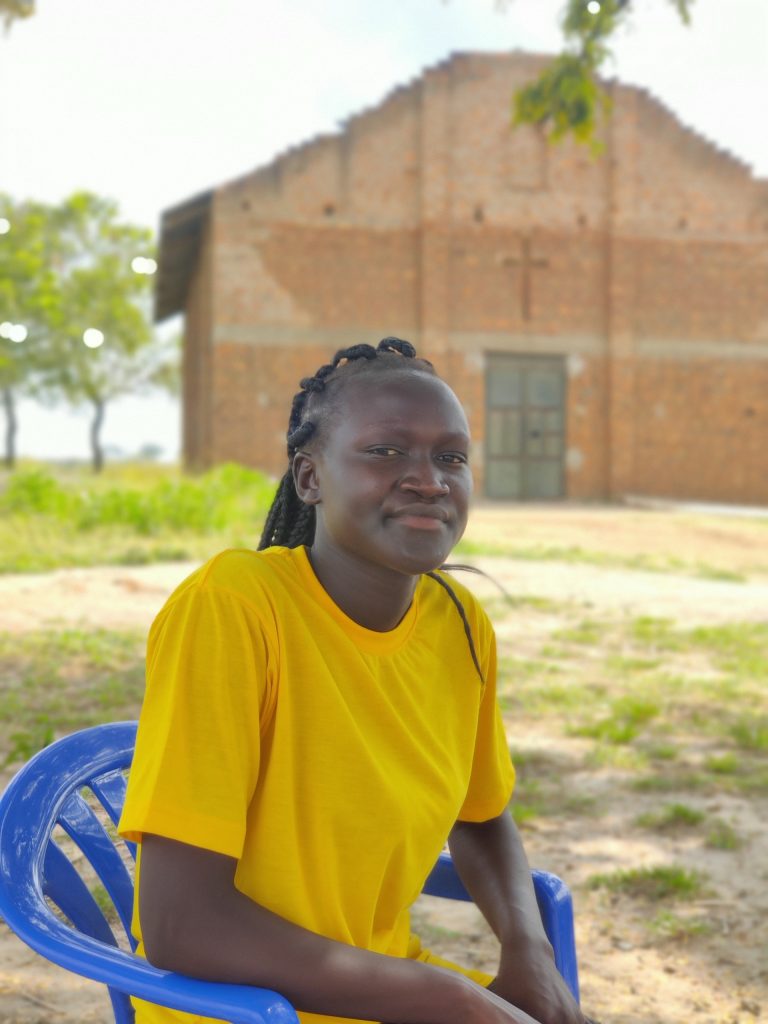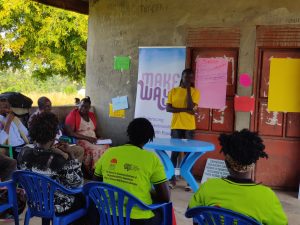Born and raised in a refugee camp, this 26-year-old is championing SRHR interventions in her community
 26 March 2024
26 March 2024

At a gathering in Ocea, one of seven zones in the Rhino Camp Refugee Settlement, 26-year-old Magdalene Yobu is handing out manila placards to her peers in attendance. Among them are young mothers, pregnant teenagers and sex workers. Magdalene who commonly goes by “Maggie” is the District Focal Person of the settlement, for both Terego and Madi-Okollo districts.
She acts on behalf of the Alliance of Women Advocating for Change (AWAC), a grassroots organization under the Make Way programme in Uganda which advocates for equitable and sustainable Universal Healthcare, and the Promotion of Human Rights and Social Economic Justice.
Maggie was born a twin in this refugee camp. Her father was among the first refugees who came here from South Sudan. “My mother told me that he came in 1992. We were born in 1997 at the Ocea Health Center. I grew up in Rhino Camp. This is home.”
Her father who was the breadwinner died when she was about 10. Maggie’s enterprising mother who today owns a makeshift restaurant inside the settlement continued to put them through school. She sent them away for school, first in a neighboring district, then later to Kampala for tertiary education, which she completed recently. During school holidays, she always returns home.
Earlier this year when she was searching for a job to supplement her mother’s income, a friend told her about an SRHR training for the Make Way programme that was happening in Arua District, 35 kms from the base camp where she resides. After months of learning about the implementation plans and the intersectional tools, Maggie was selected for the position of District Focal Person, which she now holds.
Her first order of business was to hold meetings with youth, community leaders and other stakeholders to apprise them on programme’s advocacy activities. She explains why. “Make Way works with marginalized groups of youth who face challenges accessing SRHR services. Inviting stakeholders, especially partners in the health sector was crucial to have them voice their challenges directly.”
Complaints raised included a communication gap between health workers and antenatal mothers. The latter did not understand why, for instance, sometimes their babies are born via C-section, a procedure they previously considered “unnatural”.
The meeting formed a joint monitoring committee that is responsible for ensuring that the issues raised are addressed. Maggie says the committee met up in November to follow up on what has been resolved so far. “I am proud to say that some things have changed. For example, the attitude of health workers has improved, and the girls now understand the medical processes at health centers better. There are also language translators at the clinics now.”
Since the first meeting in August, every weekend, the community youth convene at the Ocea and Ofua zone health centers where counsellors engage them in groups and one-on-one sessions on sexual and reproductive health issues. In a concentrated population community riddled with myths on contraception and sex, she says that youth have begun to approach health centers and ask about contraceptives, condoms and even HIV testing – which was not the case before. She attributes this shift to the weekend SRHR sessions initiated by the Make Way programme.

In a skilling and empowerment effort, the programme has also facilitated the training of young mothers, sex workers and other girls in making liquid soap, which they each sell in 500mls used plastic water bottles. They pool the profits in two saving groups, which consist of 15 people each. Maggie highlights the importance of these groups: “Most of the girls we work with are those who have been stigmatized by the community. They are sex workers, some are living with HIV, and most are single mothers. With AWAC’s intervention, the community is starting to understand that these people matter too.”
Financial autonomy not only provides these youth an income to survive, it offers significant protection from early marriages and pregnancies which are perpetuated, in part, by poverty. The young women in Rhino Camp Refugee Settlement face multiple vulnerabilities including refugee status, poverty, HIV status, single motherhood, illiteracy and an overwhelming amount of emotional and psychological trauma. All of these make access to SRHR information and services even more difficult. Make Way’s intervention led by their own peers is making strides in changing that. As Maggie puts: “Expressing yourself and being heard is the first solution to every problem.”



